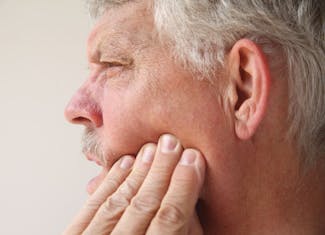Painful Jaw Function
Temporomandibular Joint Disorder (TMD) is a condition in which a person feels pain and discomfort in the muscles and joints that connect the lower jawbone (mandible) to the skull. These flexible muscles and joints are felt right in front of the ears and are needed to talk, chew, swallow, and yawn.
The most common cause of TMD is tension in the muscles that control the jaw, such as from clenching the jaw or grinding the teeth. TMD can also result from the following conditions:
- Temporomandibular Joint Problem Present at Birth
- Facial Nerve Injuries
- Facial Trauma
- Temporomandibular Joint Arthritis
- Prolonged Dental Procedures
- Orthodontia
- Postural Strain
- Injury or Arthritis of the Neck
- Stress
- Harmful Habits such as Smoking, Gum Chewing and Nail Biting
“I have had TMJ Dysfunction for the past 30 years. The effects have ranged from constant jaw popping, to a locked jaw, to the inability to move my jaw and neck.
Ellen did a thorough evaluation of my symptoms and started therapy to first alleviate the pain – then to begin exercises to relax the jaw and surrounding areas. She also showed me what exercises I can use the rest of my life when my TMJ begins to flare up – Thanks Ellen!”
Lynetta W.
Symptoms of TMD include painful jaw function (eating, chewing, talking), clicking or popping in jaw, facial pain (usually one side), headache (usually above the ear), neck pain, locking of the jaw, wear and tear of the tooth enamel, difficulty swallowing, earache and dizziness.
Our therapist will discuss with you, your current and past symptoms, previous treatments, diagnostic procedures, and your lifestyle habits. A thorough evaluation will be conducted to assess your posture, spine and extremity mobility, muscle quality, and tooth and jaw function.
Based on findings from your evaluation, the therapist will determine if physical therapy is right for your condition. Together, you and your physical therapist will proceed with a comprehensive treatment plan to resolve your symptoms.
For more information on face/jaw pain, see the Temporomandibular Disorders (TMD) section of the Medical Library.
Contact us today to schedule your initial evaluation to determine if physical therapy can resolve your symptoms of TMD.

